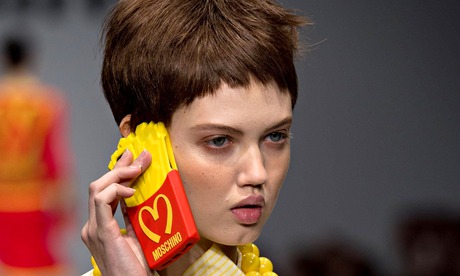The new issue of British Vogue is to be a “model-free zone” after editors decided to use only “real” women to showcase the designer clothes featured in the magazine.
Among the women included in the issue are the architectural historian Shumi Bose, the charity director Brita Fernandez Schmidt, Hello Love Studio creative director and Hello Beautiful founder Jane Hutchison, and ice-cream brand creator Kitty Travers, as well as some of the women behind London’s Crossrail project.
Alexandra Shulman, the editor of British Vogue, said she commissioned the project because she felt strongly that professional women, or women in positions of authority or power, should be able to indulge their interest in fashion without it seeming frivolous. “In this country, there is still a stigma attached to clearly enjoying how you look and experimenting with it if you are a woman in the public eye and not in the fashion or entertainment business,” she told the Telegraph.
Shulman has edited British Vogue since 1992 and is venerated for her egalitarian attitude to body image. She does not publish stories about diets or cosmetic surgery, and in 2009 wrote a letter to all major designers arguing that the tiny sample sizes they offered for shoots encouraged models to be unhealthily thin. “I was also frustrated by a few designers’ PRs choosing only to lend their clothes if they approved of the appearance of the subject to be photographed rather than what they did,” she said.
The cover of the new Vogue issue, out on 6 October, may been seen to contradict Shulman’s previous claims that readers do not want a “real person” on the front of the magazine. In an interview for BBC Radio 2 in 2014, the editor told guest presenter Lily Allen: “People always say, ‘Why do you have thin models? That’s not what real people look like,’ but nobody really wants to see a real person looking like a real person on the cover of Vogue.
“I think Vogue is a magazine that’s about fantasy to some extent, and dreams, and an escape from real life. People don’t want to buy a magazine like Vogue to see what they see when they look in a mirror. They can do that for free.”
Shulman defended the choice of the actor Emily Blunt as the cover star of the “real” issue by pointing out that she plays an everyday woman in her new film, The Girl on the Train. According to Vogue, Blunt joked about appearing on her first cover: “It took three hours of hair and makeup to get me looking this real!”
The issue comes after H&M used the 60-year-old Scottish stylist Gillean McLeod as the face of its swimwear range and US brand J Crew used staff members and their friends instead of models to showcase its clothes at New York fashion week.

The Women’s Equality party, meanwhile, is campaigning to change the fashion industry’s approach to body image by calling for designers showing in London to display at least two sample sizes, one of which must be more than a UK size 12.
Sophie Walker, the party’s leader, told the Guardian last month that these “tiny, tiny little clothes are such that normal-sized women have to starve themselves to fit into them. And we’re not talking a three-day soup diet here, which would be bad enough; we’re talking weeks and weeks of systematic malnutrition, for which young women are paid to fit into these tiny little sizes.”
Last week, four US Vogue editors were branded “jealous and hypocritical” after complaining about the presence of “pathetic” and “desperate” fashion bloggers at Milan fashion week.
Shulman distanced herself from the row, tweeting:
Alexandra Shulman (@AShulman2)Can I just be CLEAR. The current Bloggersgate furore is via American Vogue not @BritishVogue.
October 3, 2016
British Vogue ditches models in favour of "real" women – for one issue
